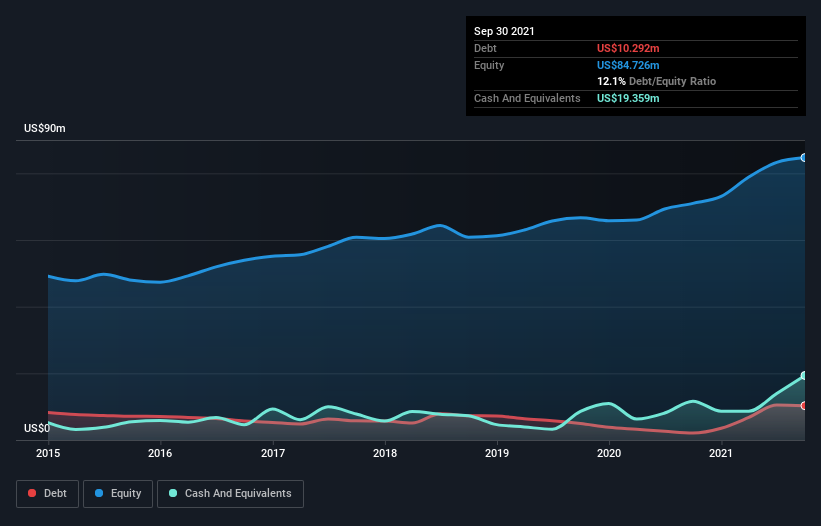Here's Why Geodrill (TSE:GEO) Can Manage Its Debt Responsibly
The external fund manager backed by Berkshire Hathaway's Charlie Munger, Li Lu, makes no bones about it when he says 'The biggest investment risk is not the volatility of prices, but whether you will suffer a permanent loss of capital.' So it might be obvious that you need to consider debt, when you think about how risky any given stock is, because too much debt can sink a company. We note that Geodrill Limited (TSE:GEO) does have debt on its balance sheet. But should shareholders be worried about its use of debt?
When Is Debt Dangerous?
Generally speaking, debt only becomes a real problem when a company can't easily pay it off, either by raising capital or with its own cash flow. Ultimately, if the company can't fulfill its legal obligations to repay debt, shareholders could walk away with nothing. However, a more common (but still painful) scenario is that it has to raise new equity capital at a low price, thus permanently diluting shareholders. Of course, the upside of debt is that it often represents cheap capital, especially when it replaces dilution in a company with the ability to reinvest at high rates of return. The first step when considering a company's debt levels is to consider its cash and debt together.
View our latest analysis for Geodrill
What Is Geodrill's Debt?
You can click the graphic below for the historical numbers, but it shows that as of September 2021 Geodrill had US$10.3m of debt, an increase on US$2.08m, over one year. However, its balance sheet shows it holds US$19.4m in cash, so it actually has US$9.07m net cash.
How Strong Is Geodrill's Balance Sheet?
The latest balance sheet data shows that Geodrill had liabilities of US$28.8m due within a year, and liabilities of US$6.24m falling due after that. Offsetting these obligations, it had cash of US$19.4m as well as receivables valued at US$22.7m due within 12 months. So it actually has US$7.03m more liquid assets than total liabilities.
This surplus suggests that Geodrill has a conservative balance sheet, and could probably eliminate its debt without much difficulty. Succinctly put, Geodrill boasts net cash, so it's fair to say it does not have a heavy debt load!
Better yet, Geodrill grew its EBIT by 172% last year, which is an impressive improvement. If maintained that growth will make the debt even more manageable in the years ahead. The balance sheet is clearly the area to focus on when you are analysing debt. But ultimately the future profitability of the business will decide if Geodrill can strengthen its balance sheet over time. So if you're focused on the future you can check out this free report showing analyst profit forecasts.
Finally, a company can only pay off debt with cold hard cash, not accounting profits. While Geodrill has net cash on its balance sheet, it's still worth taking a look at its ability to convert earnings before interest and tax (EBIT) to free cash flow, to help us understand how quickly it is building (or eroding) that cash balance. Over the last three years, Geodrill reported free cash flow worth 19% of its EBIT, which is really quite low. For us, cash conversion that low sparks a little paranoia about is ability to extinguish debt.
Summing up
While we empathize with investors who find debt concerning, you should keep in mind that Geodrill has net cash of US$9.07m, as well as more liquid assets than liabilities. And it impressed us with its EBIT growth of 172% over the last year. So we don't think Geodrill's use of debt is risky. There's no doubt that we learn most about debt from the balance sheet. However, not all investment risk resides within the balance sheet - far from it. Be aware that Geodrill is showing 4 warning signs in our investment analysis , and 1 of those can't be ignored...
Of course, if you're the type of investor who prefers buying stocks without the burden of debt, then don't hesitate to discover our exclusive list of net cash growth stocks, today.
Have feedback on this article? Concerned about the content? Get in touch with us directly. Alternatively, email editorial-team (at) simplywallst.com.
This article by Simply Wall St is general in nature. We provide commentary based on historical data and analyst forecasts only using an unbiased methodology and our articles are not intended to be financial advice. It does not constitute a recommendation to buy or sell any stock, and does not take account of your objectives, or your financial situation. We aim to bring you long-term focused analysis driven by fundamental data. Note that our analysis may not factor in the latest price-sensitive company announcements or qualitative material. Simply Wall St has no position in any stocks mentioned.

